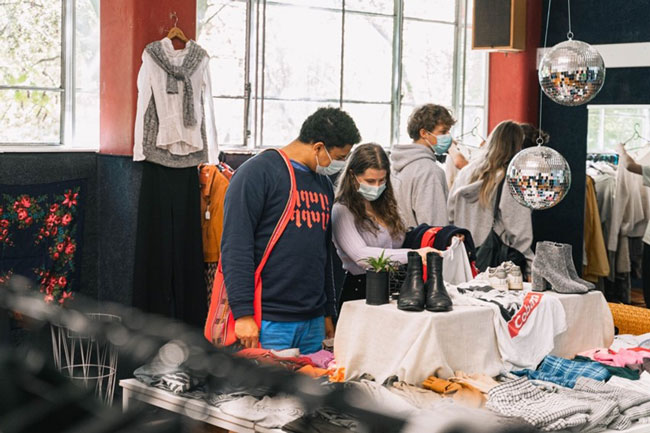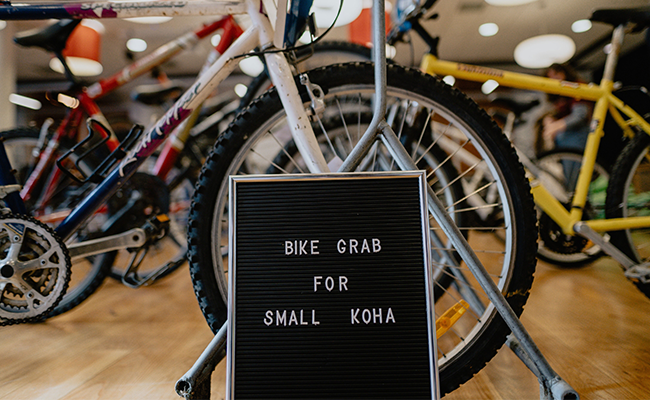 The thrift shop hosts repair cafés, skills workshops, education sessions, and volunteer 'work' experience, while providing free meeting spaces for students, along with accessible options that include reduced-price sustainable products and a refilling station for hand soap, dishwashing liquid and laundry liquid.
The thrift shop hosts repair cafés, skills workshops, education sessions, and volunteer 'work' experience, while providing free meeting spaces for students, along with accessible options that include reduced-price sustainable products and a refilling station for hand soap, dishwashing liquid and laundry liquid.
The University's Te Oraka thrift shop and sustainability hub is the only New Zealand finalist in the Australasian Green Gown Awards in the student engagement category.
“We believe it is unique in New Zealand – and possibly Australia – for one tertiary space to house so many sustainability activities,” Sustainability Office Engagement Team Leader Jes Triscott says.
None of it would have been possible without the Property Services Division supporting doing “something a bit different,” and the extent of student buy-in has been “incredibly surprising”.
All finalists will be showcased, and winners announced at the annual Green Gown Awards Australasia Gala on 17 November. Due to ongoing COVID-19 restrictions, the awards will be hosted virtually again this year.
The thrift shop hosts repair cafés, skills workshops, education sessions, and volunteer 'work' experience, while providing free meeting spaces for students, along with accessible options that include reduced-price sustainable products and a refilling station for hand soap, dishwashing liquid and laundry liquid.
Student support
Every day the store is open, students are there, shopping for second-hand clothes, furniture, kitchenware, and bedding, or repairing a bike, Jes says.
Workshops and events have had good turnouts, with a recent Night Market for students to test their small businesses attracting about 180 students, who also enjoyed the oat milk hot chocolates on offer.
Students have also completed four research projects since Te Oraka opened in April at 96 Anzac Avenue (the former Unipol gym). From four different courses, the topics they covered included behaviour change and sustainable action.
The space has been booked by three student committees as well, for safe, inclusive events and gatherings – something they had limited free access to previously.
Te Oraka helps the University's Recycling Centre too, because it gets inundated with dated furniture no longer suitable for our workplace but is still good quality and can be sold in the thrift shop, Jes says.
This finalist
The shop was created from recycled items and pours all its income into activities it hosts, subsidising refills, and developing the space.
The main focus is on reducing waste because students have relied heavily on skips, highlighting the need for alternative options, tools, and skills, she says.
When only open for three months, Te Oraka had already hosted workshops on making reusable menstrual pads, bike repairs, volunteering opportunities to build students' skills, and Tetra Pak and electrical recycling.
 Bike grabs happen every Thursday.
Bike grabs happen every Thursday.
Bike grabs also happen every Thursday between 11pm and 1pm, where students pay koha (a donation) to own a bike that has been reclaimed from landfill and refurbished.
Drop and Swaps have involved people donating to the thrift shop, the items being quality checked, then for every three items each one has accepted, they can 'swap' something out of the store for no charge.
Future plans for Te Oraka include selling portable planter boxes containing vegetable plants at a reduced price so students and staff can grow their own, Jes says.
Other plans involve clothing repair and alteration workshops, repurposing workshops, queer events, and electrical repair cafés.
Open on Tuesdays and Thursdays between 11am and 1pm, Te Oraka is operated by our Sustainability Office.
Anyone who would like more information, can contact sustainability@otago.ac.nz and follow the Sustainability Office on Facebook and Instagram.
Building on history
Sustainability Office Head Ray O'Brien says the University's Sustainability Neighbourhood won the building back better category last year. A group of University-owned flats, its students are supported to live sustainably and contribute to research projects.
Jes also received a highly commended for the Award of Excellence – Staff in last year and student Charlotte Brewer, a highly commended for the Award of Excellence – Student.
The Sustainable Campus Award was claimed by our University in 2018, for an initiative that involved working with our main energy supplier, Pioneer Energy, to stop firing its boiler with coal and start using local wood chips. Pioneer's boiler provides heat and steam to 40 per cent of the Dunedin campus's gross floor area – 29 buildings.
- Kōrero by Gail Goodger
